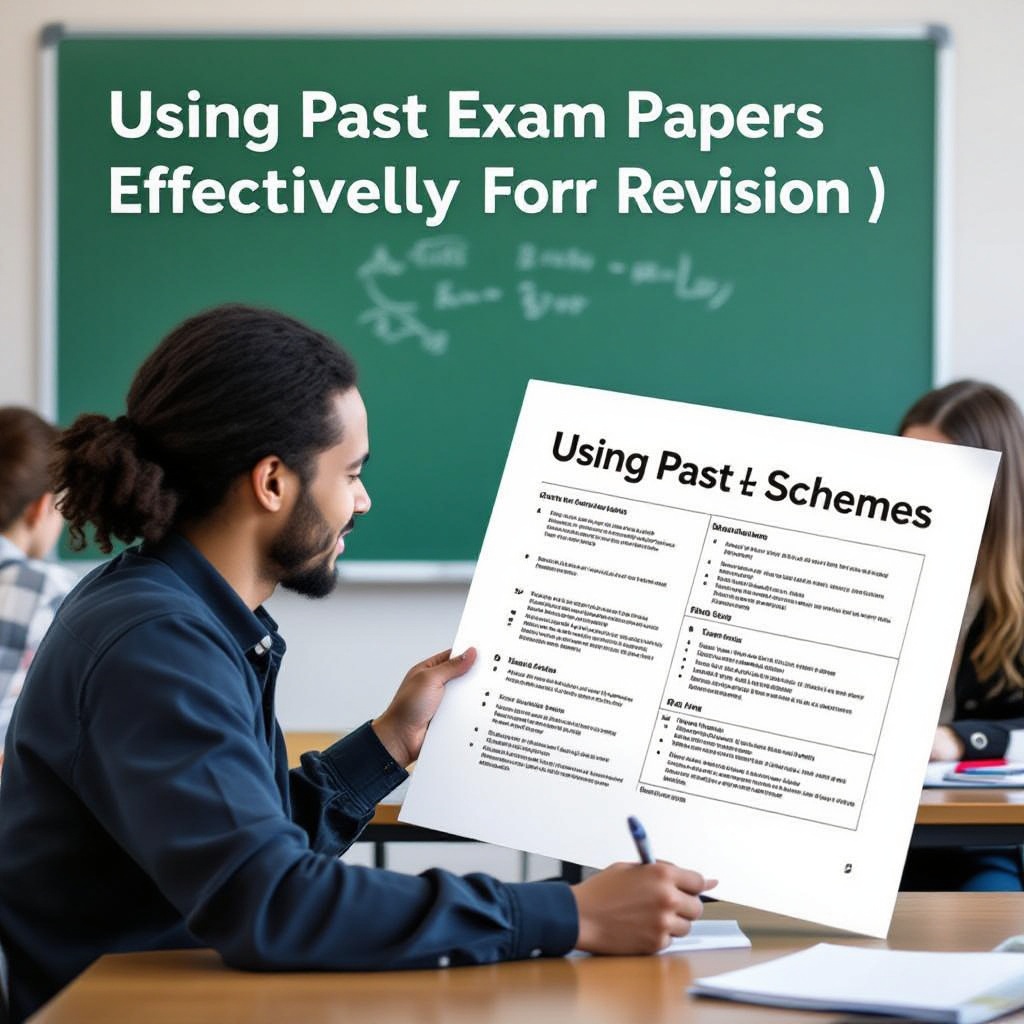Using past exam papers in your revision strategy can significantly boost exam performance by improving your skills, building confidence, and easing anxiety. Insights from the Journal of Educational Psychology support these benefits. When you work with these papers, you gain a better grasp of exam formats and expectations. This practice sharpens your timing and self-assessment abilities, ultimately leading to higher success.
Key Takeaways:
- Engaging with past exam papers could enhance exam performance by 30% as they familiarize you with exam structures and question types.
- You’ll understand mark distribution better, enabling you to manage time effectively and direct study efforts more efficiently.
- Regularly practicing with these papers reduces anxiety and boosts confidence as you get used to question formats and exam procedures.
- Reviewing mark schemes sharpens self-assessment skills and clarifies marking criteria, helping you revise with precision.
- Identifying recurring themes and question types allows you to prioritize important study topics, making your revision more productive.
Maximizing Exam Success with Past Papers: Proven Strategies for Students
Incorporating past exam papers into your study routine can significantly enhance your academic performance. Research from the Journal of Educational Psychology shows a direct link between using past papers and increased exam scores, with results pointing to a potential 30% boost in performance. Practicing consistently not only sharpens your skills but also builds confidence, reinforcing your sense of self-efficacy. This practice reduces anxiety as you’re more familiar with the exam format and types of questions. Dive into past papers regularly to ensure you’re well-prepared, using these strategies to make the most out of your study sessions.
Decoding Exam Formats and Expectations for Better Results
Working with several past exam papers gives students a solid grasp of exam structures and question types. Understanding these patterns lets you predict which areas might require more focus. Here’s how you can approach studying past papers effectively:
By analyzing past papers, you begin to notice how questions are typically framed. This understanding helps you identify specific question types, whether multiple-choice, essays, or short answers. It’s like training for the main event, where recognizing these patterns can significantly boost your confidence.
Another benefit is learning how marks are distributed. Understanding the weight of different sections ensures you allocate your time wisely during revision. You might discover that calculation-based answers carry significant marks, necessitating detailed workings.
For calculation questions, make sure to show all your workings. Examiners prefer seeing the step-by-step process rather than just the final answer. This practice can sometimes earn partial marks even if the final result isn’t perfect. Plus, it ingrains the methodologies and strengthens your problem-solving skills.
When engaging with these papers, keep in mind:
- Identify recurring themes or topics that frequently appear.
- Note the wording of questions to understand exactly what’s being asked.
- Check any provided mark schemes to verify correct approaches.
- Time yourself to simulate exam conditions, improving time management.
Using past exam papers effectively pulls back the curtain on what examiners expect, ultimately guiding you to perform better. Engaging with these resources hones your ability to zero in on critical aspects and sharpen your exam strategy.

Targeted Revision Techniques: Focus on What Matters Most
Analyzing past exam papers is an essential strategy for effective study. It lets students pinpoint frequently tested topics, ensuring that their efforts focus on high-priority areas. You can uncover patterns and themes by examining previous papers. Remember to:
- Compare several past papers to spot recurring themes.
- Note down questions that often appear, giving them extra attention in your revision.
- Prioritize subjects that seem to be favored by examiners.
This targeted focus not only saves time but also boosts confidence in covering what’s most likely to appear on exams. Channel your energy into areas that matter, making your revision sessions more productive.

Practicing Time Management and Exam Techniques for Optimal Performance
Working with past exam papers lets students sharpen their exam techniques and manage their time better. By timing themselves during practice, students can simulate exam-day pressures and enhance their ability to handle such situations smoothly.
Structured answer practices become essential here. When students practice formulating responses under timed conditions, they learn how to streamline their thoughts efficiently. This not only improves clarity but also reduces exam anxiety. Organizing your answers by including:
- An introductory statement to set the tone.
- Clear, concise content that sticks to the question.
- Logical transitions between points to maintain coherence.
- A summarizing conclusion to reinforce your answer.
These strategies ensure you remain within the word limit and avoid irrelevant details, a crucial skill on exam day. When you familiarize yourself with this approach, you’re more equipped to deal with unexpected questions. Familiarity with these patterns grants you the confidence to attempt questions based on previous knowledge without hesitation. It also maintains a focus on the task at hand and helps prevent time wasting.
Refining these techniques through regular practice with past papers maximizes one’s potential for achieving high marks. It directly correlates to success by transforming weaknesses into strengths, ensuring that on exam day, you’re ready to achieve outstanding results.
Using Mark Schemes to Enhance Learning and Self-Assessment
Utilizing official mark schemes during your revision can transform your study sessions. They allow you to objectively assess your performance, highlighting areas where you might be falling short. By matching your answers against these schemes, you gain insights into what examiners are looking for, refining your understanding of the marking criteria.
Engage in this reflective practice by considering the mark scheme as a diagnostic tool. It helps pinpoint weaknesses and paves the way for improvement. Here’s how you can use them effectively:
- Identify Patterns: Spot common errors you’re making in your answers. Are there specific topics where your points consistently don’t align with the mark scheme?
- Clarify Expectations: Understand exactly how answers should be structured to meet the highest standards. This increases your confidence in tackling questions.
- Guide Peer Review: Swap papers with classmates. Use the mark schemes to provide each other with constructive feedback. This collaborative approach can shed light on aspects you might overlook on your own.
Finally, don’t restrict this approach to just one subject. Apply it across various disciplines to foster a consistent level of progress and readiness. Whether you’re dealing with complex problem-solving in math or analytical essays in history, mark schemes will enhance your learning outcomes. Aim for an upward trajectory in your study strategy by incorporating mark schemes into your regular revision practice.

Cognitive Benefits and Reducing Exam-Day Anxiety
Frequent engagement with past exam papers boosts memory retention. This happens through retrieval practice, a process that plays a crucial role in moving information into long-term memory. Each time you practice, you’re actively recalling information, making it stick over time.
Beyond retention, working consistently with past papers helps you get familiar with exam formats. Understanding these formats makes a huge difference in reducing anxiety. You won’t feel as stressed since you’ve already encountered similar formats multiple times. Here’s how working with past papers makes you more resilient to exam-day pressure:
- Improved Confidence: By regular exposure to questions, you build confidence in your ability to tackle various types of problems.
- Effective Time Management: Practicing past papers teaches you how to allocate your time efficiently during exams.
- Error Adaptation: Reviewing past mistakes helps you adapt and avoid repeating them under exam conditions.
Utilize past papers as a key part of your preparation strategy. They provide a practical way to test your knowledge and prepare for what you’ll face on exam day.
Sources:
Apex Academic Centre – Unlocking Success: How Past Papers Can Propel Your Exam Performance
3RC – Benefits of Studying Past Exam Papers
Cleverlyy – How to Use Past Papers Effectively for Exam Preparation
InnerDrive – Revision and Practice
Oxbridge Home Learning – How to Use Past Papers for Effective Revision
Best for You – The Psychology of Successful Revision
The Uni Guide – How to Use Past Exam Papers to Revise Effectively
Cambridge Assessment – Are Past Paper Questions Always Useful? Neil Wade
